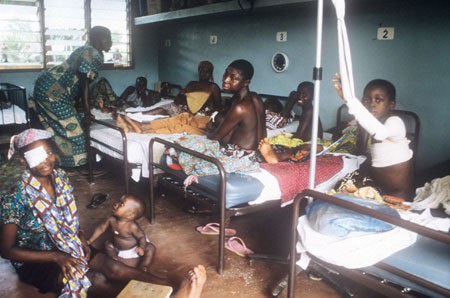Accra, Oct. 10, GNA - Between 10 per cent and 20 per cent of those, who report at the Accra Psychiatric Hospital with depression had at one time or the other contemplated suicide.
Dr Akwasi Osei, Acting Chief Psychiatrist of the Ministry of Health, said depression constituted about 40 per cent of total cases reported at the Hospital and 10 per cent to 15 per cent of the patients would have contemplated or attempted suicide at least once. Dr Osei was speaking at the launch of this year's World Mental Day in Accra, which would be celebrated under the theme: "Building Awareness: Reducing Risk: Suicide and Mental Illness". Dr Osei noted that suicide was increasingly becoming a major hazard contributing to the enormous mental illness experienced not only in Ghana but also worldwide.
Worldwide, statistics show that about one million deaths occur every year from suicide and attempted suicide constituted 1.4 per cent of the total global disease burden while 98 per cent of all persons, who committed suicide, were clinically ill.
About 68 per cent of suicides were from mood disorders, mostly depression, which alone constituted 45 per cent while chronic alcohol abuse constituted 23 per cent.
The Chief Psychiatrist said more women attempted suicide than men but more men completed suicide than women. "More men die from suicide than women and the ratio ranges from 2:1 to 7:1, even though more women try it."
He said while suicide occurred more in the developed countries the incidence was expected to increase in the developing countries, since it tended to be associated with stressful life.
Dr Osei called for the early passage of the Mental Health Bill as a major step in addressing mental health problems adding: "The Domestic Violence Bill, though not exactly a mental health issue, addresses issues of mental health concern. The passage of the Domestic Violence Bill will, therefore, go along way to reduce the risk of suicide." He called for the funding of research on national household survey on mental health; epilepsy; alcoholism and drug abuse to find out the magnitude of psychiatric cases.
He said statistics available were hospital based making it difficult for people to appreciate the seriousness of problem. Dr Osei said it was unfortunate that people did not value the essence of research and but relied on superstition, which rather compounded the existing problems.
Mr Samuel Owusu Agyei, a Deputy Minister of Health, who launched the day, said mental illness, which was the commonest cause of suicide, was treatable and preventable and called for intensified awareness of the existence of the illness.
He advised pregnant women to frequently visit antenatal clinics for proper supervision during delivery to avoid their babies being exposed to injury to the brain, which could lead to mental illness.
Mr Owusu Agyei said the Ministry had recognised and was committed to preventing health crisis, both to mental and physical, adding, "that is why we are embarking on preventive medicine".
He said the Ministry would support the move of decriminalizing attempted suicide and to treat anybody, who attempted suicide as requiring screening for mental sanity before prosecution.
"This way, we shall probably prevent the reoccurrence ... we know that among those who attempt suicide and fail, a good a number eventually try again and succeed. This is because the original cause of the first attempt - mental illness - was not recognized and treated." Mr Owusu Agyei said the Ministry had allocated three saloon cars to the three psychiatric hospitals - Accra, Pantang and Ankaful - and pledged that an ambulance would soon be given to Pantang Hospital while the other two hospitals would receive theirs later.

















